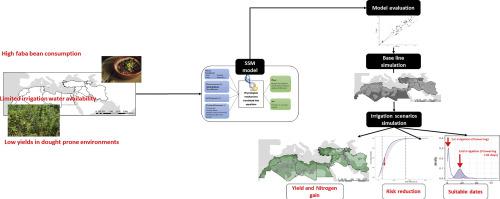Agricultural Systems ( IF 6.1 ) Pub Date : 2021-01-30 , DOI: 10.1016/j.agsy.2021.103068 Hélène Marrou , Michel Edmond Ghanem , Moez Amri , Fouad Maalouf , Sarah Ben Sadoun , Fatimaezzhara Kibbou , Thomas R. Sinclair

|
CONTEXT
Faba bean is a crucial component of Mediterranean food systems. However, the crop is somewhat underrepresented in the major crop models and usage of these models requires substantial calibration with data that might not be available. The Simple Simulation Model (SSM) is a simple, non-calibrated and physiology-based model that has the advantage of having a reduced number of parameters that can all be measured or inferred from simple experiments.
OBJECTIVE
We aimed to parameterize and assess the capacity of the SSM to simulate faba bean phenology, dry matter accumulation, nitrogen accumulation and final yield and to explore the impact of supplemental irrigation on crop production.
MATERIALS & METHODS
Model simulations were compared to observations collected over 30 experimental situations in Morocco, Tunisia, and Lebanon. SSM was then used to explore water restrictive irrigation scenarios, allowing two irrigation events after flowering, with a total irrigation dose of 50 mm, in the Middle East and in North Africa (MENA).
RESULTS AND CONCLUSIONS
The prediction error on final total above ground dry matter was satisfactory and the dynamics of dry matter and nitrogen accumulation in plant organs matched the observations. This study showed that 50 mm irrigation can be sufficient to substantially improve faba bean production sustainability in MENA. In the driest areas (below 200 mm in-season rainfall), 50 mm irrigation could reduce the risk of low crops by up to 34% and increase yield sufficiently to meet average farm household needs. In more humid areas of the region, 50 mm irrigation could improve faba bean yield by up to 1 t/ha compared to an average yield of 3.5 t/ha. Simulation outputs showed that deficit irrigation could improve N soil balance and soil health in the mid- to long-term. The analysis of the simulation results can be used to advise farmers on best adapted irrigation dates without additional in situ measurement.
SIGNIFICANCE
This study revealed that non-calibrated models such as SSM can simulate yield and dry matter accumulation with a predictive capacity similar to calibrated tools making it suitable for addressing a known gap in irrigation management for Mediterranean food systems. In the MENA region, relative small amounts of irrigation (50 mm) can substantially reduce production risk, and so increase security for farmers, and improve faba bean productivity and sustainability.
中文翻译:

一项模型研究:限制灌溉提高了中东和北非的蚕豆产量并降低了蚕豆风险
语境
蚕豆是地中海食物系统的重要组成部分。但是,主要农作物模型中的农作物代表性不足,使用这些模型需要使用可能无法获得的数据进行大量校准。简单模拟模型(SSM)是一个简单的,未经校准且基于生理的模型,具有以下优点:可以通过简单实验测量或推断的参数数量减少。
目的
我们旨在参数化和评估SSM的能力,以模拟蚕豆的物候,干物质积累,氮积累和最终产量,并探讨补充灌溉对作物生产的影响。
材料与方法
将模型模拟与在摩洛哥,突尼斯和黎巴嫩的30多个实验情况下收集的观察结果进行了比较。然后使用SSM探索水限制灌溉方案,使开花后的两个灌溉事件在中东和北非(MENA)发生两次,总灌溉剂量为50 mm。
结果与结论
地上干物质最终总量的预测误差是令人满意的,并且植物器官中干物质和氮积累的动态与观察结果一致。这项研究表明,50毫米灌溉足以显着提高中东和北非地区蚕豆生产的可持续性。在最干旱的地区(当季降雨量低于200毫米),灌溉50毫米可以使低收成的风险降低多达34%,并充分提高产量,以满足一般农户的需求。在该地区较潮湿的地区,50 mm的灌溉量可使蚕豆产量提高1吨/公顷,而平均产量为3.5吨/公顷。模拟结果表明,亏水灌溉可以在中长期改善土壤氮素平衡和土壤健康。
意义
这项研究表明,未校准的模型(例如SSM)可以模拟产量和干物质积累,其预测能力类似于已校准的工具,使其适合解决地中海食品系统在灌溉管理方面的已知缺陷。在中东和北非地区,相对少量的灌溉(50毫米)可以大大降低生产风险,从而提高农民的安全性,并提高蚕豆的生产力和可持续性。











































 京公网安备 11010802027423号
京公网安备 11010802027423号